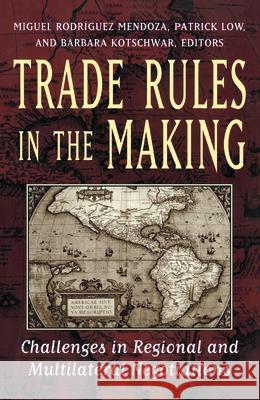Trade Rules in the Making: Challenges in Regional and Multilateral Negotiations » książka
Trade Rules in the Making: Challenges in Regional and Multilateral Negotiations
ISBN-13: 9780815756798 / Angielski / Miękka / 1999 / 564 str.
In April 1998 negotiations were launched to create a free trade area among thirty-four countries in the Western Hemisphere. The Free Trade Area of the Americas (FTAA) will eliminate barriers to trade in goods and services and will remove restrictions on investment among the countries of North, Central, and South America and the Caribbean. At the same time, negotiators in the World Trade Organization (WTO) are preparing to begin talks on agriculture and services, with the possibility of a new round of WTO negotiations. Trade policymakers are confronted with a wide range of complex issues and various forums for trade liberalization. Modern trade negotiations no longer focus only on barriers to trade in goods, but include a wide array of issues. This volume aims to clarify these issues. Contributors first address themes, including the evolution of regional arrangements in the Western Hemisphere and the relationship between regional trade arrangements and the multilateral trading system. Robert Hudec provides an in-depth analysis of the provisions and future implications of Article XXIV, the WTO article that regulates regional arrangements; Robert Lawrence examines regional arrangements and their relationship to the multilateral trading system; and Miguel Rodriguez Mendoza tests several Latin American arrangements to see whether they comply with the WTO criteria. Other contributors discuss key components of the current trade policy agenda, including market access approaches, trade in services, investment, competition policy, intellectual property rights, trade remedy laws, and dispute settlement. Also examined are smaller economies in trade negotiations, and labor and the environment. The book serves both as an analytical examination of regionalism and multilateralism and a primer for international trade negotiators. Copublished with the Organization of American States"











